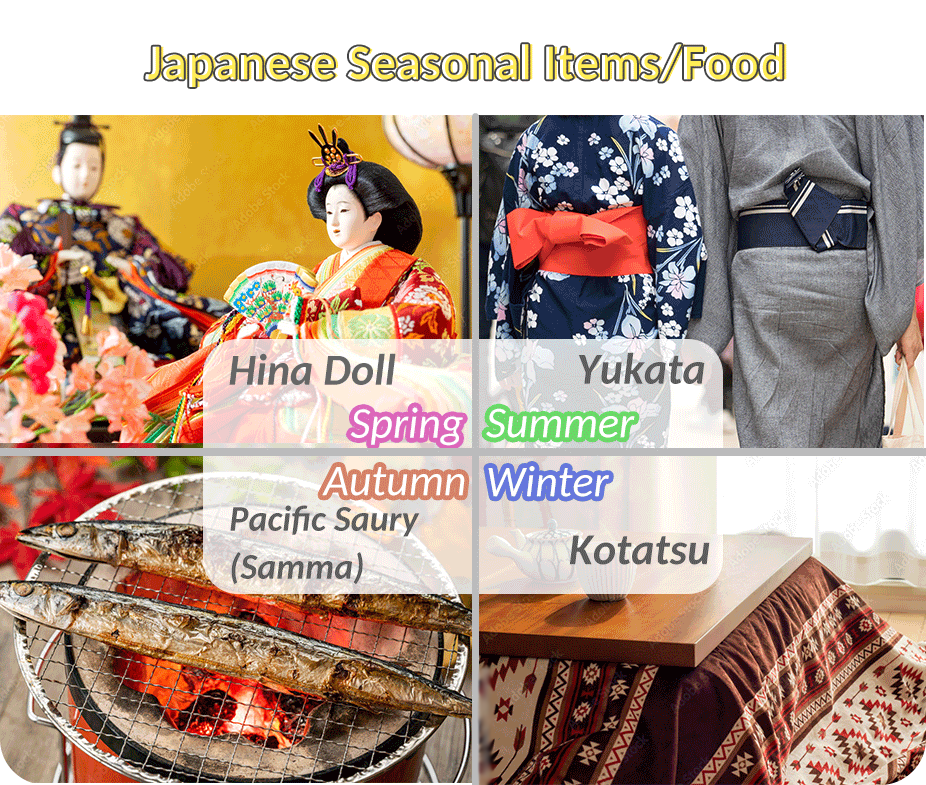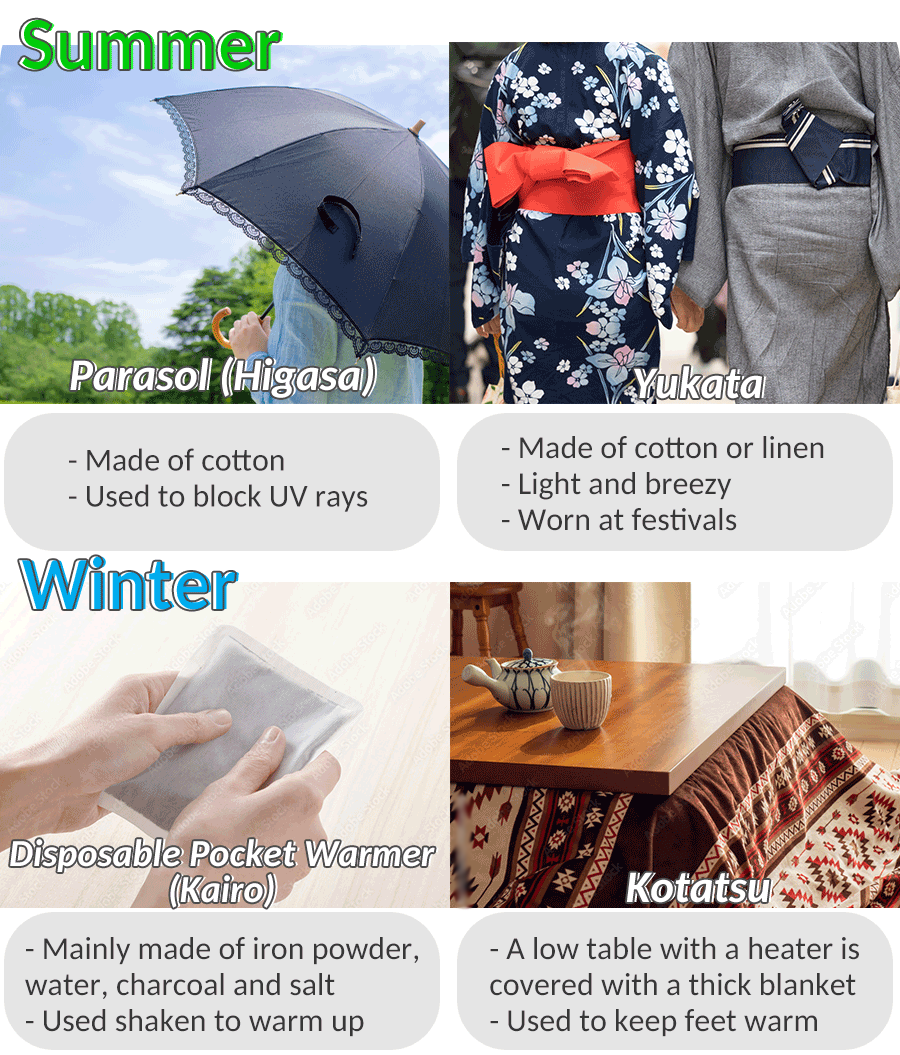Part A Introduction & Ice break

A_1
Let’s introduce ourselves to each other.
My name is ________. What is your name?
A_2
I am ________. Nice to meet you.


A_3
Nice to meet you too, ________. What’s your plan for this weekend?
A_4
| Answer: |


A_5
I see. Let’s begin our lesson!
Part B Dialogue Practice

B_1
We’ll read aloud the dialogue below. I will check your pronunciation and intonation. Then, we’ll switch roles.
B_2

|
TUTOR:
|
I’m researching traditional Japanese seasonal items. I’ve found that some people wear yukatas in the summer. Do you? |
|
STUDENT:
|
Yes, they are often worn when going to summer events. I have some photos of them. Look at this. |
|
TUTOR:
|
Wow, there are many different patterns, and they are so beautiful! |
|
STUDENT:
|
Many are made of cotton. It’s light and breezy. |
|
TUTOR:
|
I want to get one! So, what about winter items? |
|
STUDENT:
|
Well… Kotatsu is a low table with a heater. It’s covered with a thick blanket to keep your feet warm. |
|
TUTOR:
|
It looks so warm and cozy in the freezing winter! |
*pattern: 模様、柄
*thick: 厚手の
*cozy:(暖かくて)居心地のよい
*thick: 厚手の
*cozy:(暖かくて)居心地のよい


B_3
Now, let’s switch roles. I will check your pronunciation and intonation.
B_4

|
STUDENT:
|
I’m researching traditional Japanese seasonal items. I’ve found that some people wear yukatas in the summer. Do you? |
|
TUTOR:
|
Yes, they are often worn when going to summer events. I have some photos of them. Look at this. |
|
STUDENT:
|
Wow, there are many different patterns, and they are so beautiful! |
|
TUTOR:
|
Many are made of cotton. It’s light and breezy. |
|
STUDENT:
|
I want to get one! So, what about winter items? |
|
TUTOR:
|
Well… Kotatsu is a low table with a heater. It’s covered with a thick blanket to keep your feet warm. |
|
STUDENT:
|
It looks so warm and cozy in the freezing winter! |
*pattern: 模様、柄
*thick: 厚手の
*cozy:(暖かくて)居心地のよい
*thick: 厚手の
*cozy:(暖かくて)居心地のよい


B_5
Now, let’s review some words and expressions.
B_6


B_7
Now, I will ask the following questions. Please answer based on the dialogue.

B_8
| 1. | When are yukatas often worn? |
B_9
| Answer: |


B_10
| 2. | What are yukatas made of? |
B_11
| Answer: |


B_12
| 3. | What is kotatsu covered with? |
B_13
| Answer: |


B_14
| 4. | How does kotatsu make your feet warm? |
B_15
| Answer: |


B_16
Now, let’s review your answers.
B_17

Part C Q&A

C_1
Look at the picture below. Choose one item, and answer the questions.

C_2
| 1. | What traditional items do you know? Are there any items you usually use? |
C_3

| Answer: |
*UV rays: 紫外線
*breezy: 風通しのよい
*disposable: 使い捨ての
*iron powder: 鉄粉
*charcoal: 炭
*breezy: 風通しのよい
*disposable: 使い捨ての
*iron powder: 鉄粉
*charcoal: 炭


C_4
| 2. | When do you use it? |
C_5
| Answer: |


C_6
| 3. | What is it made of? |
C_7
| Answer: |


C_8
You did amazing! Let’s go on to the next.
C_9

Part D Let’s try

D_1
Make a presentation based on the answers you have given in the questions in Part C.
D_2

*UV rays: 紫外線
*breezy: 風通しのよい
*disposable: 使い捨ての
*iron powder: 鉄粉
*charcoal: 炭
*breezy: 風通しのよい
*disposable: 使い捨ての
*iron powder: 鉄粉
*charcoal: 炭
| Answer: |
ヒント:
I wear a yukata in the summer, especially to summer events.
It is mainly made of cotton or linen.
It is so light and breezy that wearing a yukata makes us feel cool and comfortable.
We can find our favorite ones in many beautiful patterns.
You can buy one for around 5,000 yen.
I wear a yukata in the summer, especially to summer events.
It is mainly made of cotton or linen.
It is so light and breezy that wearing a yukata makes us feel cool and comfortable.
We can find our favorite ones in many beautiful patterns.
You can buy one for around 5,000 yen.


D_3
That was awesome! Now, let’s review your answers.
D_4

Part E Q&A 2

E_1
Answer the questions using the phrases you have learned.

E_2
| 1. | What is the parasol made of? |
E_3
| Answer: |
ヒント:____ is made of …
*UV rays: 紫外線
*breezy: 風通しのよい
*disposable: 使い捨ての
*iron powder: 鉄粉
*charcoal: 炭
*UV rays: 紫外線
*breezy: 風通しのよい
*disposable: 使い捨ての
*iron powder: 鉄粉
*charcoal: 炭


E_4
| 2. | How is a disposable pocket warmer used? |
E_5
| Answer: |
ヒント:_____ is shaken to …


E_6
| 3. | What kind of food do you want to eat in summer? What is it made of? |
E_7
| Answer: |
ヒント:
It is made of … (材料)
It is made from …(原料)
It helps me feel cool on hot summer days.
It is made of … (材料)
It is made from …(原料)
It helps me feel cool on hot summer days.


E_8
| 3. | What kind of food do you want to eat in winter? What is it made of? |
E_9
| Answer: |
ヒント:
It is made of … (材料)
It is made from …(原料)
It helps me keep my body warm on cold days.
It is made of … (材料)
It is made from …(原料)
It helps me keep my body warm on cold days.


E_10
Great job! Your answers were fantastic!